Argumentative Essay: Environmental View of the Future of Humankind
VerifiedAdded on 2023/04/23
|7
|1654
|92
Essay
AI Summary
This argumentative essay explores the future of humankind from an environmental perspective, analyzing the impact of population growth, technological development, and urbanization on the environment. It examines optimistic viewpoints, emphasizing responsible consumption and resource conservation, while also acknowledging the potential for an unprecedented environmental crisis. The essay advocates for radical changes in human behavior, supported by governmental collaboration, to promote environmental sustainability and safeguard the future of humankind. It highlights the need for reduced consumption, increased resource conservation, and the adoption of alternative energy sources to mitigate the threats to the planet's life support systems. The essay concludes with a call for collaborative efforts and individual responsibility in creating a sustainable future for generations to come, emphasizing that collective action can still avert the worst environmental outcomes.
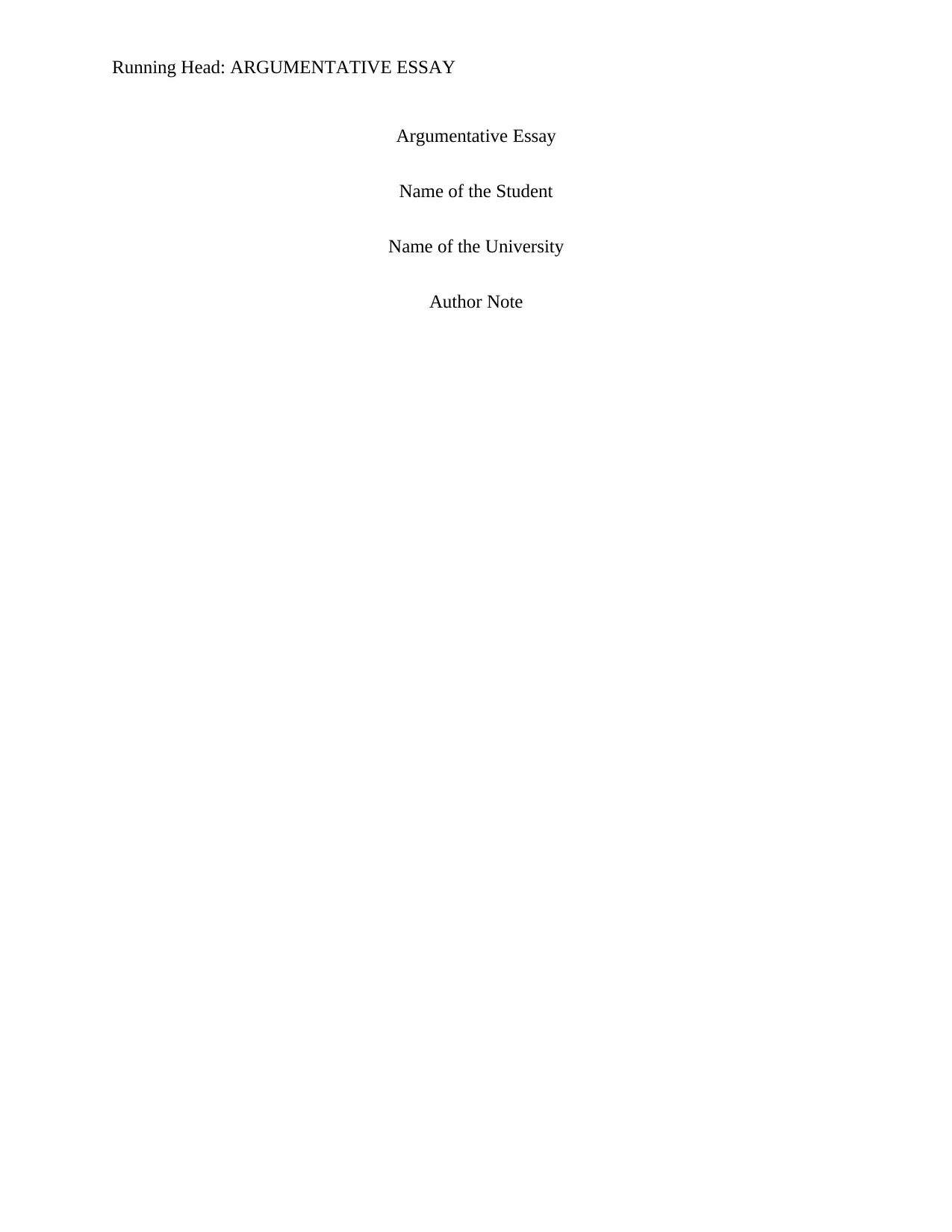
Running Head: ARGUMENTATIVE ESSAY
Argumentative Essay
Name of the Student
Name of the University
Author Note
Argumentative Essay
Name of the Student
Name of the University
Author Note
Paraphrase This Document
Need a fresh take? Get an instant paraphrase of this document with our AI Paraphraser
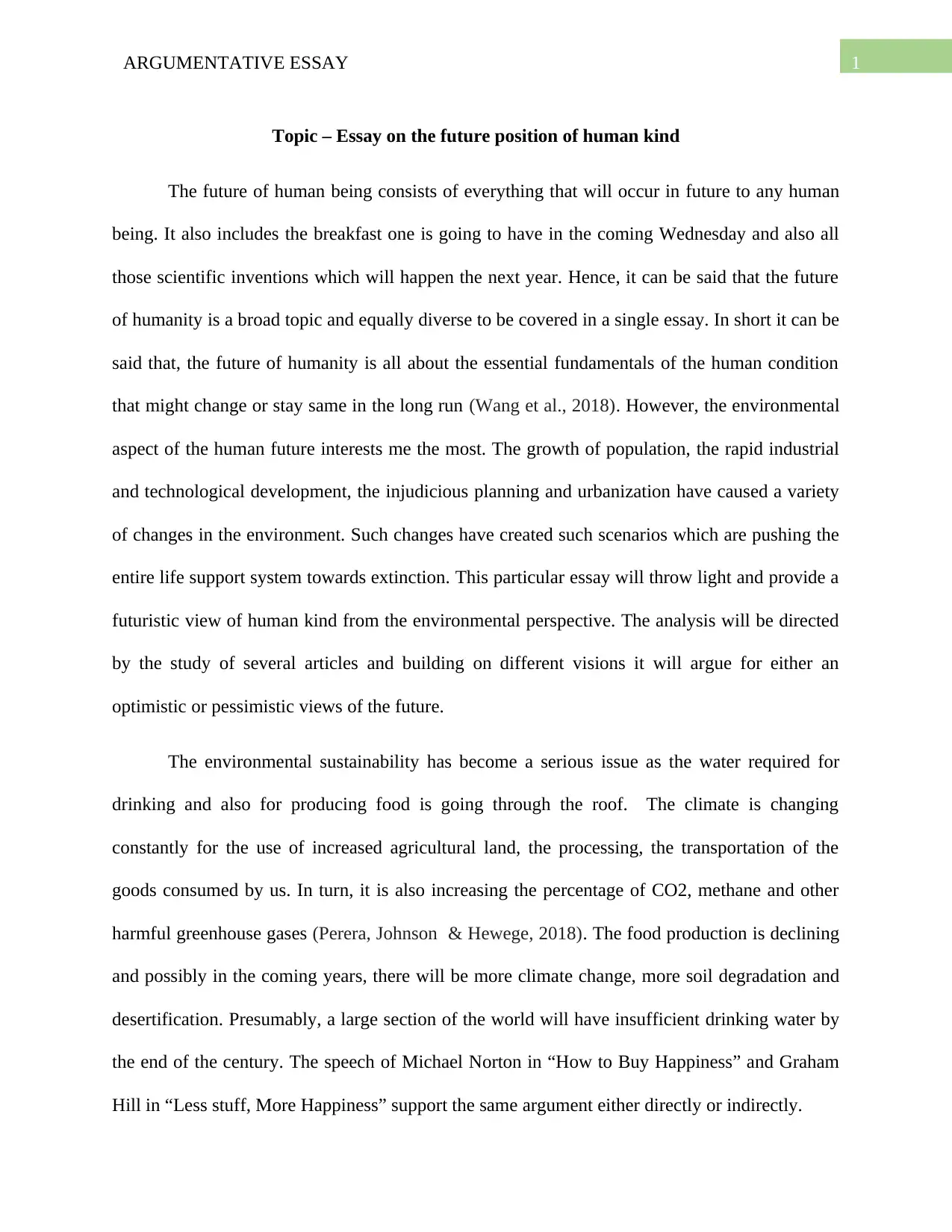
1ARGUMENTATIVE ESSAY
Topic – Essay on the future position of human kind
The future of human being consists of everything that will occur in future to any human
being. It also includes the breakfast one is going to have in the coming Wednesday and also all
those scientific inventions which will happen the next year. Hence, it can be said that the future
of humanity is a broad topic and equally diverse to be covered in a single essay. In short it can be
said that, the future of humanity is all about the essential fundamentals of the human condition
that might change or stay same in the long run (Wang et al., 2018). However, the environmental
aspect of the human future interests me the most. The growth of population, the rapid industrial
and technological development, the injudicious planning and urbanization have caused a variety
of changes in the environment. Such changes have created such scenarios which are pushing the
entire life support system towards extinction. This particular essay will throw light and provide a
futuristic view of human kind from the environmental perspective. The analysis will be directed
by the study of several articles and building on different visions it will argue for either an
optimistic or pessimistic views of the future.
The environmental sustainability has become a serious issue as the water required for
drinking and also for producing food is going through the roof. The climate is changing
constantly for the use of increased agricultural land, the processing, the transportation of the
goods consumed by us. In turn, it is also increasing the percentage of CO2, methane and other
harmful greenhouse gases (Perera, Johnson & Hewege, 2018). The food production is declining
and possibly in the coming years, there will be more climate change, more soil degradation and
desertification. Presumably, a large section of the world will have insufficient drinking water by
the end of the century. The speech of Michael Norton in “How to Buy Happiness” and Graham
Hill in “Less stuff, More Happiness” support the same argument either directly or indirectly.
Topic – Essay on the future position of human kind
The future of human being consists of everything that will occur in future to any human
being. It also includes the breakfast one is going to have in the coming Wednesday and also all
those scientific inventions which will happen the next year. Hence, it can be said that the future
of humanity is a broad topic and equally diverse to be covered in a single essay. In short it can be
said that, the future of humanity is all about the essential fundamentals of the human condition
that might change or stay same in the long run (Wang et al., 2018). However, the environmental
aspect of the human future interests me the most. The growth of population, the rapid industrial
and technological development, the injudicious planning and urbanization have caused a variety
of changes in the environment. Such changes have created such scenarios which are pushing the
entire life support system towards extinction. This particular essay will throw light and provide a
futuristic view of human kind from the environmental perspective. The analysis will be directed
by the study of several articles and building on different visions it will argue for either an
optimistic or pessimistic views of the future.
The environmental sustainability has become a serious issue as the water required for
drinking and also for producing food is going through the roof. The climate is changing
constantly for the use of increased agricultural land, the processing, the transportation of the
goods consumed by us. In turn, it is also increasing the percentage of CO2, methane and other
harmful greenhouse gases (Perera, Johnson & Hewege, 2018). The food production is declining
and possibly in the coming years, there will be more climate change, more soil degradation and
desertification. Presumably, a large section of the world will have insufficient drinking water by
the end of the century. The speech of Michael Norton in “How to Buy Happiness” and Graham
Hill in “Less stuff, More Happiness” support the same argument either directly or indirectly.
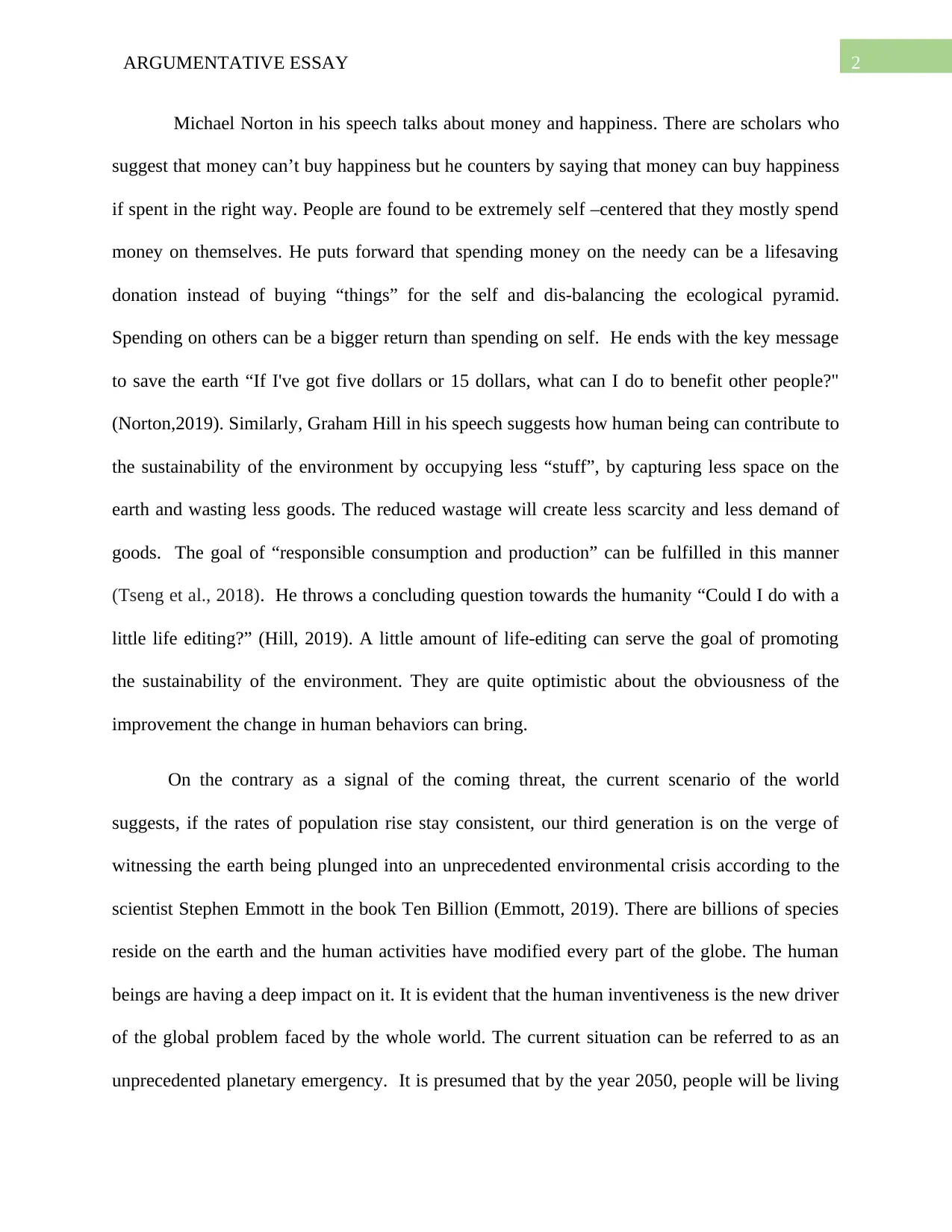
2ARGUMENTATIVE ESSAY
Michael Norton in his speech talks about money and happiness. There are scholars who
suggest that money can’t buy happiness but he counters by saying that money can buy happiness
if spent in the right way. People are found to be extremely self –centered that they mostly spend
money on themselves. He puts forward that spending money on the needy can be a lifesaving
donation instead of buying “things” for the self and dis-balancing the ecological pyramid.
Spending on others can be a bigger return than spending on self. He ends with the key message
to save the earth “If I've got five dollars or 15 dollars, what can I do to benefit other people?"
(Norton,2019). Similarly, Graham Hill in his speech suggests how human being can contribute to
the sustainability of the environment by occupying less “stuff”, by capturing less space on the
earth and wasting less goods. The reduced wastage will create less scarcity and less demand of
goods. The goal of “responsible consumption and production” can be fulfilled in this manner
(Tseng et al., 2018). He throws a concluding question towards the humanity “Could I do with a
little life editing?” (Hill, 2019). A little amount of life-editing can serve the goal of promoting
the sustainability of the environment. They are quite optimistic about the obviousness of the
improvement the change in human behaviors can bring.
On the contrary as a signal of the coming threat, the current scenario of the world
suggests, if the rates of population rise stay consistent, our third generation is on the verge of
witnessing the earth being plunged into an unprecedented environmental crisis according to the
scientist Stephen Emmott in the book Ten Billion (Emmott, 2019). There are billions of species
reside on the earth and the human activities have modified every part of the globe. The human
beings are having a deep impact on it. It is evident that the human inventiveness is the new driver
of the global problem faced by the whole world. The current situation can be referred to as an
unprecedented planetary emergency. It is presumed that by the year 2050, people will be living
Michael Norton in his speech talks about money and happiness. There are scholars who
suggest that money can’t buy happiness but he counters by saying that money can buy happiness
if spent in the right way. People are found to be extremely self –centered that they mostly spend
money on themselves. He puts forward that spending money on the needy can be a lifesaving
donation instead of buying “things” for the self and dis-balancing the ecological pyramid.
Spending on others can be a bigger return than spending on self. He ends with the key message
to save the earth “If I've got five dollars or 15 dollars, what can I do to benefit other people?"
(Norton,2019). Similarly, Graham Hill in his speech suggests how human being can contribute to
the sustainability of the environment by occupying less “stuff”, by capturing less space on the
earth and wasting less goods. The reduced wastage will create less scarcity and less demand of
goods. The goal of “responsible consumption and production” can be fulfilled in this manner
(Tseng et al., 2018). He throws a concluding question towards the humanity “Could I do with a
little life editing?” (Hill, 2019). A little amount of life-editing can serve the goal of promoting
the sustainability of the environment. They are quite optimistic about the obviousness of the
improvement the change in human behaviors can bring.
On the contrary as a signal of the coming threat, the current scenario of the world
suggests, if the rates of population rise stay consistent, our third generation is on the verge of
witnessing the earth being plunged into an unprecedented environmental crisis according to the
scientist Stephen Emmott in the book Ten Billion (Emmott, 2019). There are billions of species
reside on the earth and the human activities have modified every part of the globe. The human
beings are having a deep impact on it. It is evident that the human inventiveness is the new driver
of the global problem faced by the whole world. The current situation can be referred to as an
unprecedented planetary emergency. It is presumed that by the year 2050, people will be living
⊘ This is a preview!⊘
Do you want full access?
Subscribe today to unlock all pages.

Trusted by 1+ million students worldwide
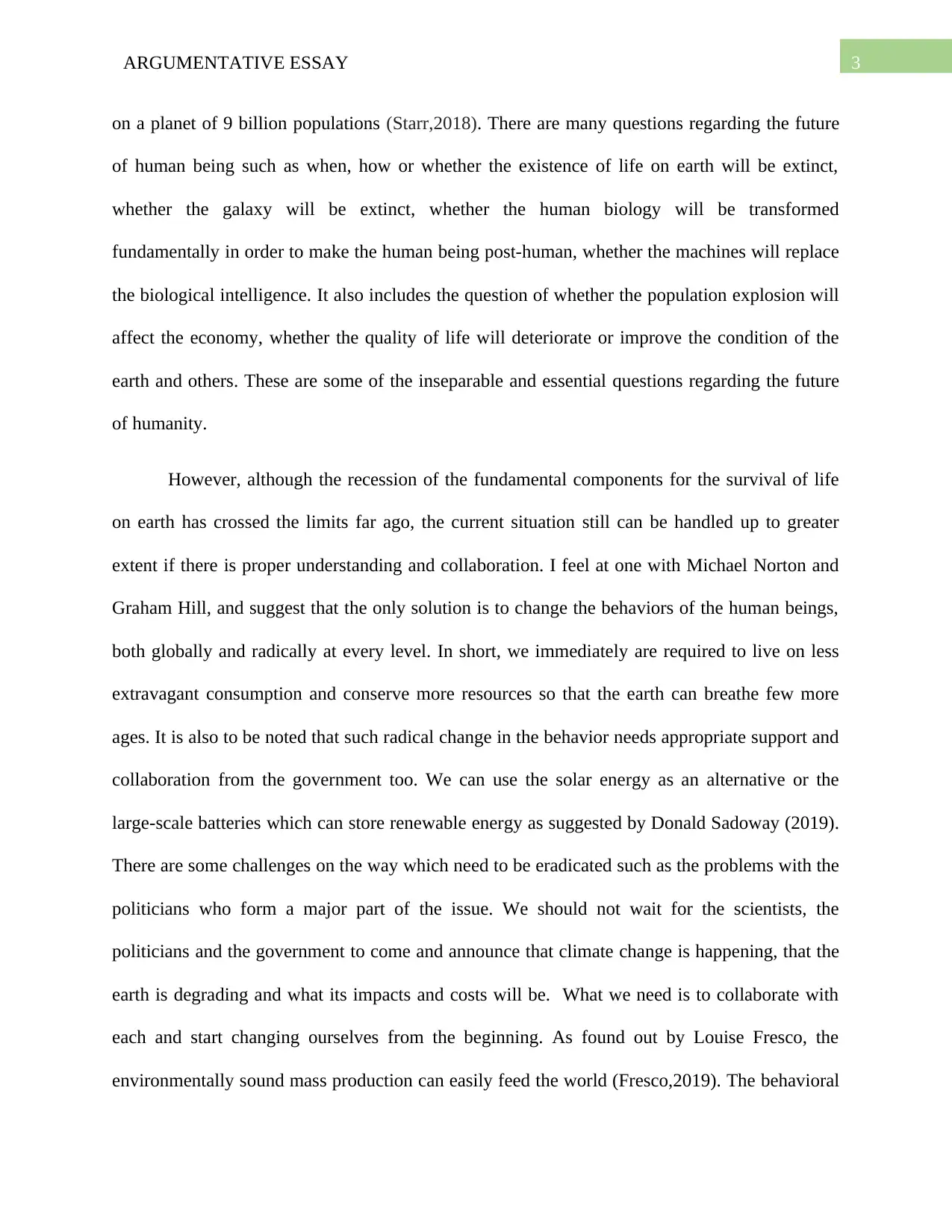
3ARGUMENTATIVE ESSAY
on a planet of 9 billion populations (Starr,2018). There are many questions regarding the future
of human being such as when, how or whether the existence of life on earth will be extinct,
whether the galaxy will be extinct, whether the human biology will be transformed
fundamentally in order to make the human being post-human, whether the machines will replace
the biological intelligence. It also includes the question of whether the population explosion will
affect the economy, whether the quality of life will deteriorate or improve the condition of the
earth and others. These are some of the inseparable and essential questions regarding the future
of humanity.
However, although the recession of the fundamental components for the survival of life
on earth has crossed the limits far ago, the current situation still can be handled up to greater
extent if there is proper understanding and collaboration. I feel at one with Michael Norton and
Graham Hill, and suggest that the only solution is to change the behaviors of the human beings,
both globally and radically at every level. In short, we immediately are required to live on less
extravagant consumption and conserve more resources so that the earth can breathe few more
ages. It is also to be noted that such radical change in the behavior needs appropriate support and
collaboration from the government too. We can use the solar energy as an alternative or the
large-scale batteries which can store renewable energy as suggested by Donald Sadoway (2019).
There are some challenges on the way which need to be eradicated such as the problems with the
politicians who form a major part of the issue. We should not wait for the scientists, the
politicians and the government to come and announce that climate change is happening, that the
earth is degrading and what its impacts and costs will be. What we need is to collaborate with
each and start changing ourselves from the beginning. As found out by Louise Fresco, the
environmentally sound mass production can easily feed the world (Fresco,2019). The behavioral
on a planet of 9 billion populations (Starr,2018). There are many questions regarding the future
of human being such as when, how or whether the existence of life on earth will be extinct,
whether the galaxy will be extinct, whether the human biology will be transformed
fundamentally in order to make the human being post-human, whether the machines will replace
the biological intelligence. It also includes the question of whether the population explosion will
affect the economy, whether the quality of life will deteriorate or improve the condition of the
earth and others. These are some of the inseparable and essential questions regarding the future
of humanity.
However, although the recession of the fundamental components for the survival of life
on earth has crossed the limits far ago, the current situation still can be handled up to greater
extent if there is proper understanding and collaboration. I feel at one with Michael Norton and
Graham Hill, and suggest that the only solution is to change the behaviors of the human beings,
both globally and radically at every level. In short, we immediately are required to live on less
extravagant consumption and conserve more resources so that the earth can breathe few more
ages. It is also to be noted that such radical change in the behavior needs appropriate support and
collaboration from the government too. We can use the solar energy as an alternative or the
large-scale batteries which can store renewable energy as suggested by Donald Sadoway (2019).
There are some challenges on the way which need to be eradicated such as the problems with the
politicians who form a major part of the issue. We should not wait for the scientists, the
politicians and the government to come and announce that climate change is happening, that the
earth is degrading and what its impacts and costs will be. What we need is to collaborate with
each and start changing ourselves from the beginning. As found out by Louise Fresco, the
environmentally sound mass production can easily feed the world (Fresco,2019). The behavioral
Paraphrase This Document
Need a fresh take? Get an instant paraphrase of this document with our AI Paraphraser
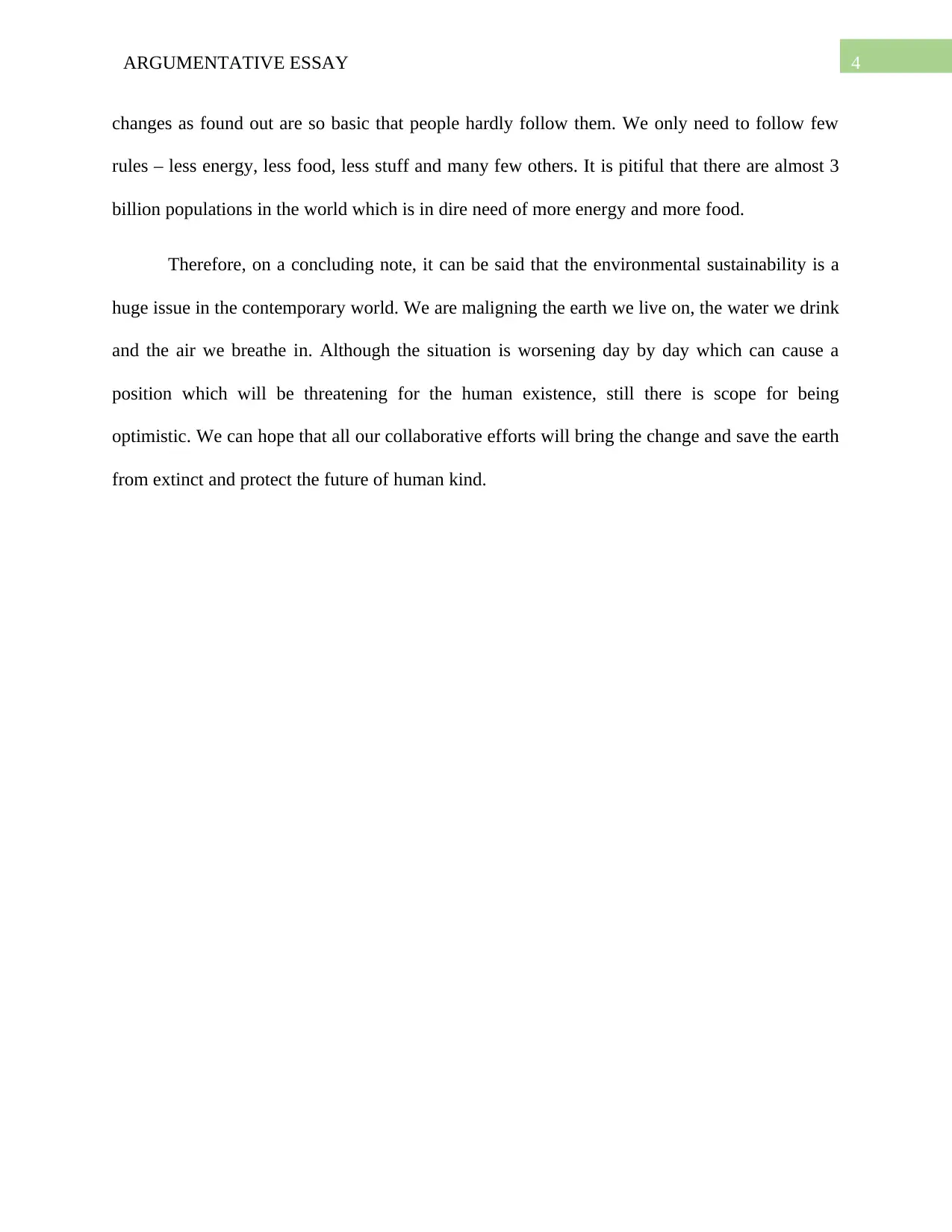
4ARGUMENTATIVE ESSAY
changes as found out are so basic that people hardly follow them. We only need to follow few
rules – less energy, less food, less stuff and many few others. It is pitiful that there are almost 3
billion populations in the world which is in dire need of more energy and more food.
Therefore, on a concluding note, it can be said that the environmental sustainability is a
huge issue in the contemporary world. We are maligning the earth we live on, the water we drink
and the air we breathe in. Although the situation is worsening day by day which can cause a
position which will be threatening for the human existence, still there is scope for being
optimistic. We can hope that all our collaborative efforts will bring the change and save the earth
from extinct and protect the future of human kind.
changes as found out are so basic that people hardly follow them. We only need to follow few
rules – less energy, less food, less stuff and many few others. It is pitiful that there are almost 3
billion populations in the world which is in dire need of more energy and more food.
Therefore, on a concluding note, it can be said that the environmental sustainability is a
huge issue in the contemporary world. We are maligning the earth we live on, the water we drink
and the air we breathe in. Although the situation is worsening day by day which can cause a
position which will be threatening for the human existence, still there is scope for being
optimistic. We can hope that all our collaborative efforts will bring the change and save the earth
from extinct and protect the future of human kind.
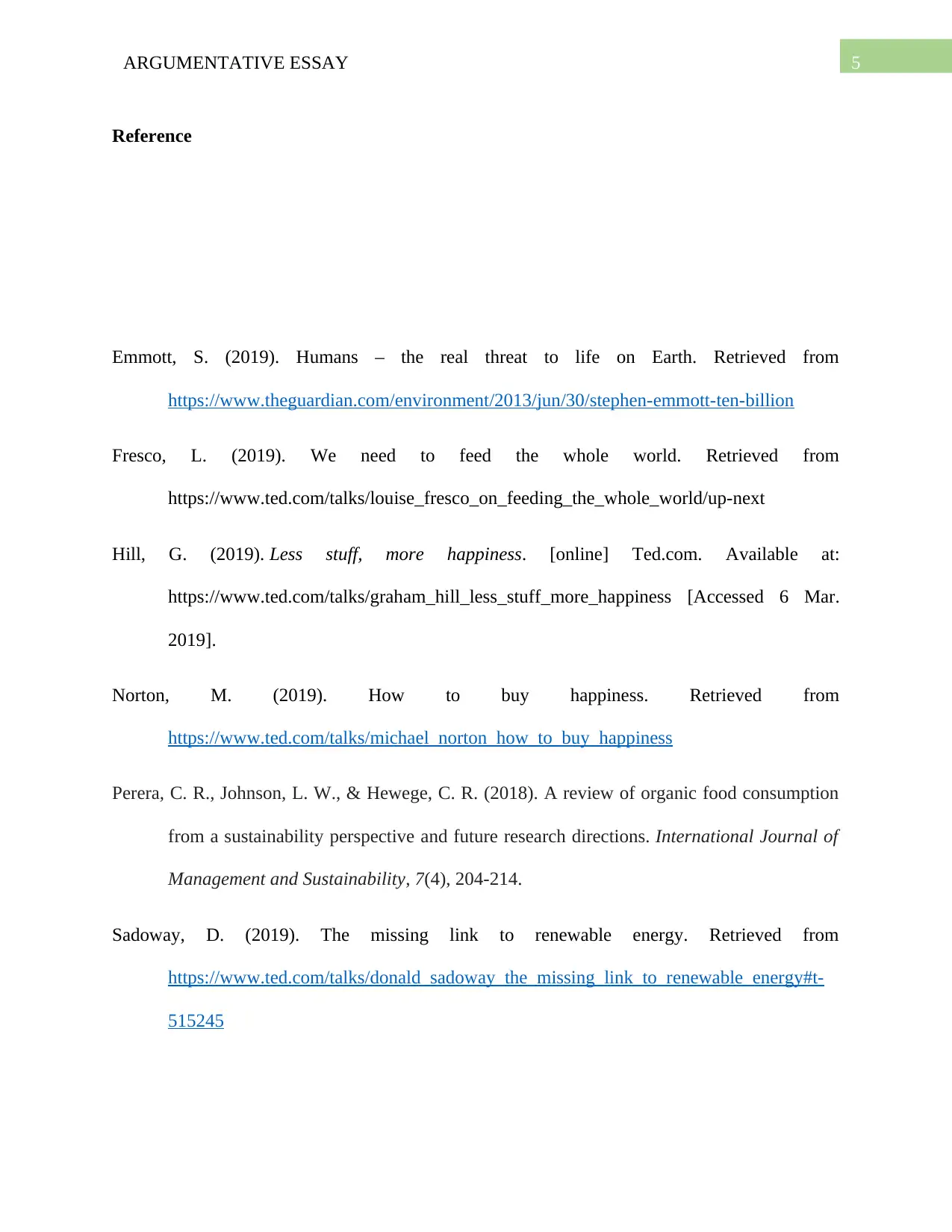
5ARGUMENTATIVE ESSAY
Reference
Emmott, S. (2019). Humans – the real threat to life on Earth. Retrieved from
https://www.theguardian.com/environment/2013/jun/30/stephen-emmott-ten-billion
Fresco, L. (2019). We need to feed the whole world. Retrieved from
https://www.ted.com/talks/louise_fresco_on_feeding_the_whole_world/up-next
Hill, G. (2019). Less stuff, more happiness. [online] Ted.com. Available at:
https://www.ted.com/talks/graham_hill_less_stuff_more_happiness [Accessed 6 Mar.
2019].
Norton, M. (2019). How to buy happiness. Retrieved from
https://www.ted.com/talks/michael_norton_how_to_buy_happiness
Perera, C. R., Johnson, L. W., & Hewege, C. R. (2018). A review of organic food consumption
from a sustainability perspective and future research directions. International Journal of
Management and Sustainability, 7(4), 204-214.
Sadoway, D. (2019). The missing link to renewable energy. Retrieved from
https://www.ted.com/talks/donald_sadoway_the_missing_link_to_renewable_energy#t-
515245
Reference
Emmott, S. (2019). Humans – the real threat to life on Earth. Retrieved from
https://www.theguardian.com/environment/2013/jun/30/stephen-emmott-ten-billion
Fresco, L. (2019). We need to feed the whole world. Retrieved from
https://www.ted.com/talks/louise_fresco_on_feeding_the_whole_world/up-next
Hill, G. (2019). Less stuff, more happiness. [online] Ted.com. Available at:
https://www.ted.com/talks/graham_hill_less_stuff_more_happiness [Accessed 6 Mar.
2019].
Norton, M. (2019). How to buy happiness. Retrieved from
https://www.ted.com/talks/michael_norton_how_to_buy_happiness
Perera, C. R., Johnson, L. W., & Hewege, C. R. (2018). A review of organic food consumption
from a sustainability perspective and future research directions. International Journal of
Management and Sustainability, 7(4), 204-214.
Sadoway, D. (2019). The missing link to renewable energy. Retrieved from
https://www.ted.com/talks/donald_sadoway_the_missing_link_to_renewable_energy#t-
515245
⊘ This is a preview!⊘
Do you want full access?
Subscribe today to unlock all pages.

Trusted by 1+ million students worldwide
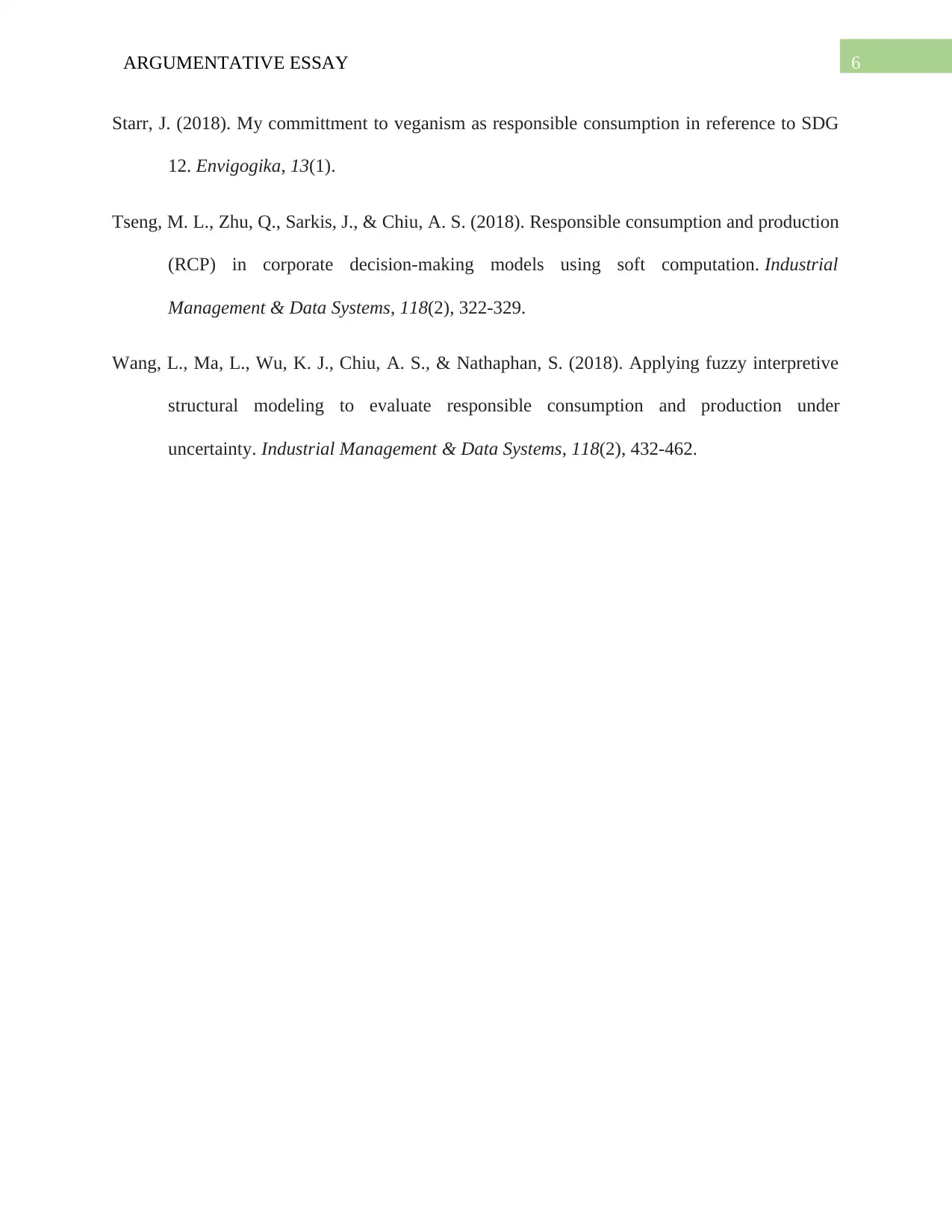
6ARGUMENTATIVE ESSAY
Starr, J. (2018). My committment to veganism as responsible consumption in reference to SDG
12. Envigogika, 13(1).
Tseng, M. L., Zhu, Q., Sarkis, J., & Chiu, A. S. (2018). Responsible consumption and production
(RCP) in corporate decision-making models using soft computation. Industrial
Management & Data Systems, 118(2), 322-329.
Wang, L., Ma, L., Wu, K. J., Chiu, A. S., & Nathaphan, S. (2018). Applying fuzzy interpretive
structural modeling to evaluate responsible consumption and production under
uncertainty. Industrial Management & Data Systems, 118(2), 432-462.
Starr, J. (2018). My committment to veganism as responsible consumption in reference to SDG
12. Envigogika, 13(1).
Tseng, M. L., Zhu, Q., Sarkis, J., & Chiu, A. S. (2018). Responsible consumption and production
(RCP) in corporate decision-making models using soft computation. Industrial
Management & Data Systems, 118(2), 322-329.
Wang, L., Ma, L., Wu, K. J., Chiu, A. S., & Nathaphan, S. (2018). Applying fuzzy interpretive
structural modeling to evaluate responsible consumption and production under
uncertainty. Industrial Management & Data Systems, 118(2), 432-462.
1 out of 7
Your All-in-One AI-Powered Toolkit for Academic Success.
+13062052269
info@desklib.com
Available 24*7 on WhatsApp / Email
![[object Object]](/_next/static/media/star-bottom.7253800d.svg)
Unlock your academic potential
Copyright © 2020–2026 A2Z Services. All Rights Reserved. Developed and managed by ZUCOL.